calsfoundation@cals.org
Samuel West Peel (1831–1924)
Samuel West Peel’s diversified career in Arkansas included roles as a businessman, politician, county clerk, Confederate soldier, lawyer, prosecuting attorney, congressman, Indian agent, and banker. In Benton County and Arkansas, he is best remembered as the first native-born Arkansan to be elected to the United States Congress.
Sam Peel was born in Independence County on September 13, 1831, to John Wilson Peel, a farmer and merchant, and Elizabeth West Peel. He had two sisters. Peel was four years old when his mother died. His father left him with his grandparents and moved to Carrollton (Carroll County), making a home on Crooked Creek and remarrying. John Peel and his second wife, Malinda Wilson, had eleven children.
As a youth, Peel worked as a clerk in his father’s store, as well as serving as deputy court clerk to his father. On January 30, 1853, he married Mary Emaline Berry. They had nine children, of whom eight survived childhood.
In 1858, and again in 1860 and 1862, Peel was elected Carroll County clerk. When the Civil War erupted, Peel hid the county records in a burial vault in the cemetery to protect them from Union soldiers. After Arkansas seceded, Peel enlisted in the Confederate army as a private in Captain James M. Pittman’s company. Fellow soldiers elected him major in the Third Regiment, Arkansas Infantry (State Troops). Peel was in combat in the Battle of Wilson’s Creek and the Battle of Prairie Grove. He then joined the Fourth Arkansas Infantry, Adams Regiment. One historical entry records Peel as being in the Fourth Arkansas Cavalry; National Archives records show that Peel mustered out at the end of the war as a lieutenant colonel in Little Rock (Pulaski County).
At war’s end, Peel returned home to Carrollton, finding his home burned down. Peel retrieved the saved county records, but in 1866, when fire broke out in the new log, courthouse, the records were destroyed.
Studying law under his brother-in-law, Judge James Middleton Pittman, Peel was admitted to the bar in 1865 and moved his family to Hindsville (Madison County), where he opened his law practice. By the spring of 1867, Peel moved his law office to Bentonville (Benton County), and two years later, Peel’s brother-in-law, future governor James Henderson Berry, carried his practice to Bentonville and formed a partnership with Peel that lasted five years.
In 1873, Governor Elisha Baxter appointed Peel as prosecuting attorney for the vacant position in the Fourth Circuit. Peel performed well in the position and was rewarded for this diligence by being elected on April 26, 1873, by popular vote. He continued holding this office until 1876.
In 1875, Peel commissioned the building of his new fourteen-room family home. “The Oaks,” so named for the many surrounding oak trees, is on the National Register of Historic Places, now known as the Peel Museum and Botanical Garden. The Peels left The Oaks in 1904, moving to 201 West Central Street.
In 1880, Peel was defeated in his first bid for Congress, but two years later, he became the first native-born Arkansan to be elected to the U.S. Congress, serving as a Fourth District representative his first term (1883–1885) and representing the Fifth District for his four succeeding terms (1885–1893). Peel dealt with wide-ranging issues: patronage and spoils of elected officials, railroads and interstate commerce, agricultural experimental stations, and the survey of Indian lands and tribes. His interest in Indian affairs led him to the House Chairmanship of the Committee on Indian Affairs, overseeing the care, education, and management of Indians and their lands as well as dealing with land right-of-way issues and payment of depredation claims.
In 1892, Peel was defeated for reelection by Hugh Anderson Dinsmore of Fayetteville (Washington County). Leaving Congress, Peel returned to Arkansas and the practice of law while forming a law partnership in Washington DC specializing in Indian cases, having been appointed attorney for all the civilized tribes. By 1890, he retired from law practice and organized the first bank in Bentonville, First State Bank of Arkansas.
On December 18, 1924, Peel died at the age of ninety-three. He is interred in Bentonville Cemetery.
For additional information:
Black, J. Dickson. History of Benton County. Little Rock: International Graphics Industry, 1975.
Easly, Barbara P., compiler. Obituaries of Benton County, Arkansas. Vol. 7: 1923–1925. Bowie, MD: Heritage Books, Inc., 1994.
“Hon. S. W. Peel.” Benton County Pioneer 37 (Summer 1992): 43–45.
John Spurgeon
Bella Vista, Arkansas


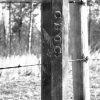




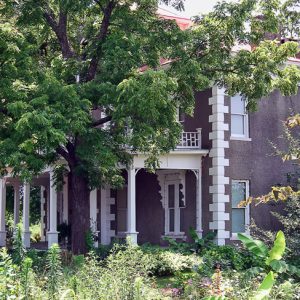
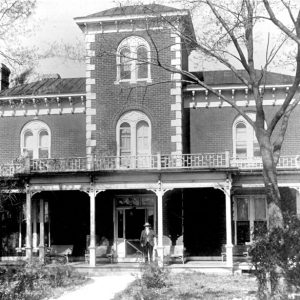
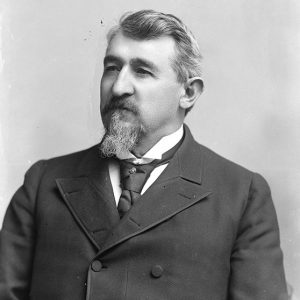
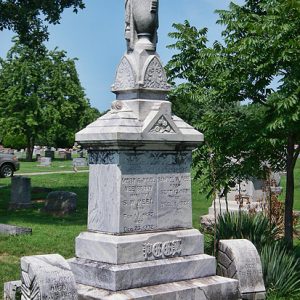




Comments
No comments on this entry yet.